#In the epic of Ramayana
Text
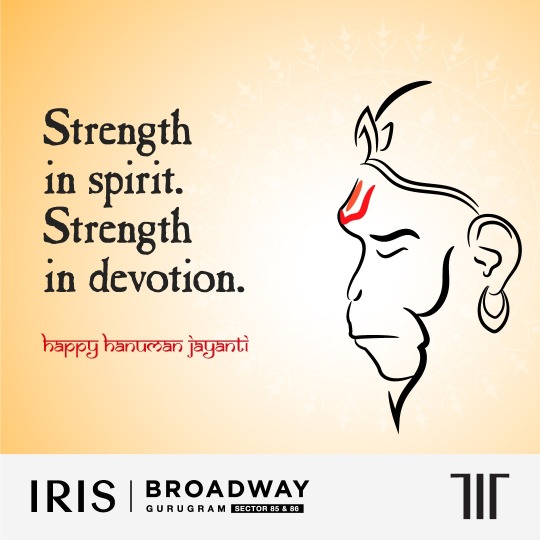
In the epic of Ramayana, Lord Hanuman exemplified unwavering loyalty, boundless strength, and infinite compassion. His life story teaches us the importance of faith and service to humanity. Let’s reflect on the lessons he imparts and seek his guidance. Wishing you all a blessed Hanuman Jayanti.
#Trehan #TrehanIris #IrisBroadway #IBGW #HanumanJayanti #Strength #Devotion #Perseverance #Faith #Compassion
#In the epic of Ramayana#Lord Hanuman exemplified unwavering loyalty#boundless strength#Trehan#TrehanIris#IrisBroadway#IBGW#HanumanJayanti#Strength#Devotion#Perseverance#Faith#Compassion#irisbroadwaygurugram#commercialprojectingurgaon#irisbroadwaygurgaon#broadwaygurgaon#trehanirisgurugram#realestate#trehanirisfamily
1 note
·
View note
Text
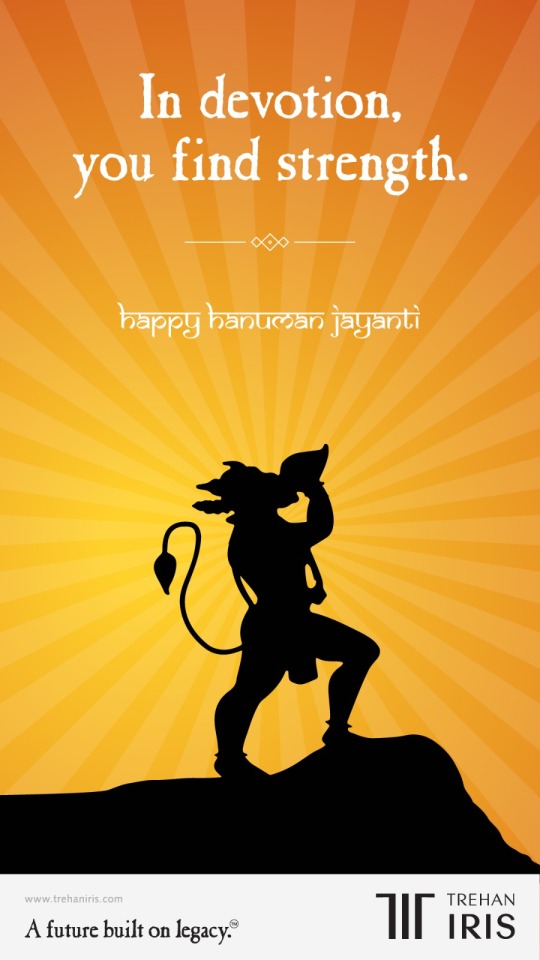
In the epic of Ramayana, Lord Hanuman exemplified unwavering loyalty, boundless strength, and infinite compassion. His life story teaches us the importance of faith and service to humanity. Let’s reflect on the lessons he imparts and seek his guidance. Wishing you all a blessed Hanuman Jayanti.
#Trehan #TrehanIris #IrisBroadway #IBGW #HanumanJayanti #Strength #Devotion #Perseverance #Faith #Compassion
#In the epic of Ramayana#Lord Hanuman exemplified unwavering loyalty#boundless strength#Trehan#TrehanIris#IrisBroadway#IBGW#HanumanJayanti#Strength#Devotion#Perseverance#Faith#Compassion#trehanirisbroadway#realestate#trehanirisfamily#irisbroadwaynoida#premiumcommercialproperty
0 notes
Text
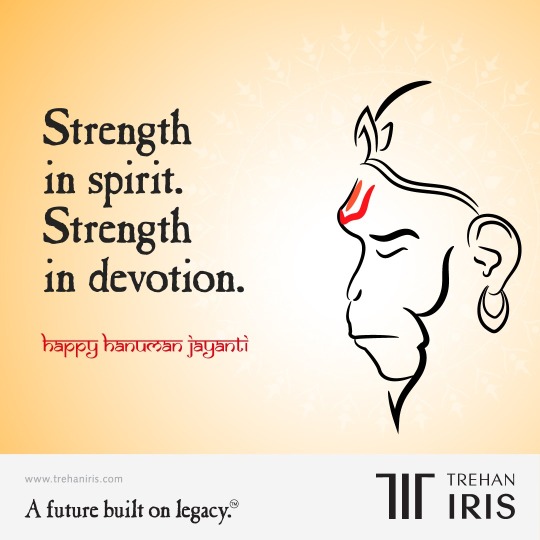
In the epic of Ramayana, Lord Hanuman exemplified unwavering loyalty, boundless strength, and infinite compassion. His life story teaches us the importance of faith and service to humanity. Let’s reflect on the lessons he imparts and seek his guidance. Wishing you all a blessed Hanuman Jayanti.
#Trehan #TrehanIris #IrisBroadway #IBGW #HanumanJayanti #Strength #Devotion #Perseverance #Faith #Compassion
#In the epic of Ramayana#Lord Hanuman exemplified unwavering loyalty#boundless strength#Trehan#TrehanIris#IrisBroadway#IBGW#HanumanJayanti#Strength#Devotion#Perseverance#Faith#Compassion#intelligentinvestment#irisbroadwaygrenowest#heartofnoidaextension#realestate#trehanirisbroadway#trehanirisfamily#irisbroadwayanchorshops
0 notes
Text
epic poem smackdown! tell me which epic is your favorite (and why! if you feel so inclined). apologies in advance to everyone whose favorite i left off but unfortunately tumblr is stifling my power with this ten option limit
#also if you pick homer tell me which one in the tags!#i didn't feel justified giving him two spots lmao#but i know people have strong iliad vs. odyssey feelings#have not read all of these btw but god i want to#tagamemnon#the iliad#the odyssey#the epic of gilgamesh#beowulf#tain bo cuailnge#the aeneid#mahabharata#ramayana#shahnameh#the divine comedy#classics#epic poetry
2K notes
·
View notes
Text

#mythology memes#hindu mythology#hindublr#desiblr#mahabharata memes#hinduism#hindu myths#hindu#vyasa#ved vyas#ved vyasa#valmiki#valmiki ramayan#ramayana#memes#hindu mythology memes#hindu memes#hindu epics#desi tumblr#desi tag#being desi#sanatandharma#sanatani
138 notes
·
View notes
Text
The Epic Trend | A Meta
Disclaimer : Proceed with caution and only if you have the fortitude to digest facts and other people's opinions.
So, I have thought about this long and hard. Usually, I would not have bothered with this as I have found interacting with varied people, that the crowd has this juvenile mentality to believe what they want to, irrespective of whether anyone can provide any reasonable and fact based argument against it.
But it is also true that in recent times the strategy of building a false narrative has been weaponised to unforeseen levels. And if there is even one measly post in a near decrepit online platform which might help people in understanding all parts of the story before forming a judgement, then it is my duty to, what do they...yes, put it out there.
Now, the facts I have sited are referenced from the most accepted translated versions of the epics but because the original Sanskrit versions are in a poetic format, I still cannot claim that they are completely a hundred percent right.
But I will say, they are the most correct versions available to us at this point.
The conclusions I have drawn for the reasoning of why these ignominious trends have started are completely my own opinions though. The explanation for the following can be different but according to me these are the most logical ones.
The main narrative which I have found through my extensive reading of modern day retellings of the Ramayana and the Mahabharata are the white washing of the main antagonists of the stories.
The entire concept of writing a story from the antagonist's perspective is to ultimately understand their thinking process. What situations and circumstances propelled them to engage in acts which had sealed their fates at the end. And most writers of Hindu lore and myths are fascinated with publishing books making the most, so called unpopular character, the protagonists in their stories.
Now, see this would have worked had they only written the stories from their perspective and not changed the entire sequence of events to glorify them, which they ultimately do.
Popular media versions of the Ramayana which have spoken from Ravana's perspective. Now, even if the televised shows and animated versions of the Ramayana are mostly left alone, the books have started the trend of glorifying Ravana and the Asuras.
Why, one must ask did everyone suddenly start sympathizing with Dashanana all of a sudden?
A very simple answer, which I have found to be most reasonably accurate is - caste.
Or what the western media, anti-hindu cults and pseudo-liberals like to call is the potential regressive behaviour of Hindus based on caste division.
Anand Neelakantan in his book, 'Asura' writes about Ravana and his clan. His entire format is written in a way which continuously degrades Rama and his allies, including Hanumana and the Vanaras while constantly trying to show Ravana as this man victimized by fate and circumstance.
The propaganda behind his storyline is clear. It is trying to proclaim a caste based discrimination in Hinduism. Neelakantan says that the Asuras were a degraded caste, similar to the shudras, the vanaras held a similar position - a minority, whereas the Raghuvanshis were from the Kshatriya caste - the so to speak higher position holders in the society.
Ravana defied this social hierarchy and reached to great heights in both warfare and wealth acquisitions and thus it angered the Devas who in turn decided that he had to be stopped and brought down.
This was the reasoning of the author as to why the war of Lanka should have happened and Sita was merely a used pawn. The entire story of her being Ravana's daughter and the former not wanting her to live in adversity with her husband and then Rama asking for the agnipariksha at the end making Sita regret her decision to not listen to Ravana was - for the lack of a better word, atrocious. As was the truly horrifying plotline of Angada humiliating Mandodari when they had come for the peace mission to Lanka.
Two other books, which I have read are from the very popular author, Kavita Kane who writes about the trials and tribulations of Urmila and Surpanakha. In those stories, the Raghuvanshis are shown as this patriarchal family who are completely unsympathetic towards the woes of the women in the story. They constantly degrade the struggle of the women.
Same is the case with Chitra Banerjee Divakurni's, Forest of Enchantments. The royal women of Ayodhya are treated horribly through the subtle workings of inherent and regressive traditions of the Kshatriya families and the Asuras are portrayed as the more open minded and empowered yet discriminated bunch.
All throughout these stories, the authors have included themes created by their own imagination, taking help of folklore and creative liberty to try and manipulate people into thinking that our faith and religion has always been orthodox, rigid and invalidated.
Had they mentioned in specifically in their preface that this is basically, fanfiction and not their 'interpretation' / 'interpolation' of the original epics, it still would have been acceptable. But they didn't.
Well to cut the story short, this is all, again because I am an uncultured brat - utter bullshit.
First of all, Ravana was the son of the great sage Vishrava and the Princess of the Asuras, Kaikesi. He was a brahmin by birth and cousin to Kubera the God of wealth.
He was definitely not from a so called lower caste.
The Asuras in general were step brothers to the Devas according to our Puranas. Their common father was Maharishi Kashyap and their mothers were Diti and Aditi. So they were in all respects, equal to the Devas in all ways.
This invalidates all claims that Asuras were from a lower caste and that Ravana had any societal and hierarchical restrictions.
Secondly the stories about Angada and Sita being Ravana's daughter are folklore and are not mentioned in the original script of the Valmiki Ramayana. So, they cannot be accepted as a basis for instigating debate into the edicts of Hinduisim based on the epics.
The original epic of Ramayana does not specify what happened in Ayodhya when Rama, Lakshmana and Sita were in exile. So any and all accounts of the interactions of the maidens during that period, in Ayodhya's palace are the writer's own imagination. Again, fiction and cannot be taken as facts to argue the apparent discrepancies in the epic.
Now, we come to Mahabharata where the issue of caste resurfaces again with a vengeance.
Here, I would say the televised and movie versions of the epic are much more to blame than the books and retellings.
People love the story of the underdog.
The man who was bogged down by society and constantly discredited due to things beyond his control.
The ill fated, the odd ducks, the black sheep - we love them.
Thus emerged Karna and to some extent, Ekalavya.
I won't even go to the depths of how much Karna and Ekalavya have been romanticised and glorified in the recent media. I will only try to understand why the uprising started.
Karna is a sutaputra, which was why everyone apparently insulted and degraded him and invalidated his achievements. Ekalavya was from the Nishada tribe. That is why Drona refused to teach him and later cut off his finger.
At least these are what I hear mostly.
So, number one, sorry to say my dears who are sitting ignorant, you all have been duped. Suta, the varna is formed when a brahmin woman marries a kshatriya man. Radha, Karna's adoptive mother was a brahmin and Adhiratha, his adopted father was a kshatriya. Infact, he was the leader of all the charioteers of the Kuru Empire and held the reigns of Bhishma's chariot himself. He was no poor destitute shudra like everyone thinks.
You know, who else were Sutas?
Sanjaya and Vidura of Hastinapura's court and Sudeshna, the Queen of Mastya Pradesh. Her brother, Keechaka who was Matsya's commander. (As said in KMG)
So, the varna had charioteers, ministers, commanders and Kings too included in it.
Now coming to how he was apparently discriminated which is again, wrong.
He wasn't turned away when he came to Drona like they show in the popular media. Drona took him in and taught him with the rest of the Kurus. Karna left when he accused the former of partiality towards Arjuna when Drona refused to give him the Bramhasheera.
A weapon he only gave to Arjuna and Ashwatthama. Arjuna because he completed the test that was given to everyone and Ashwatthama because Drona couldn't refuse his own son.
Draupadi didn't stop him from completing the swayamvara , again like everyone loves to show. This is directly translated from Vyasa's texts by BORI CE which is the most accepted version. He could lift the bow and string it but he couldn't hit the target.
Later when he tries fighting with a disguised Arjuna when everyone jumps into the podium to snatch Draupadi away, he gets defeated and asks the latter whether he was Indra, Parashurama or Vishnu himself, (again, this is directly translated by BORI) because a mere brahmin could not have defeated him.
Later when Chitrasena and his Gandharvas attack Duryodhana when he insults one of their women during the Pandavas exile, Karna runs away from the battle because he couldn't defeat them. Arjuna and Bheema, instructed by Yudhishtira have to come to their rescue. Again, this is directly translated from the epic.
Then in Virataparva, Arjuna single handedly defeats Hastinapura's entire army and their warriors including Karna. He still couldn't face him in war and runs away when his chariot is destroyed.
Now, coming to Ekalavya.
I just don't get where all the hype is coming for Karna of all people. Just because someone decided that he was downtrodden and discriminated against.
Also, the people who love to ship Draupadi with Karna, please know that you are shipping a woman with her abuser.
Yes, Karna did verbally abuse he. He called her a Veishya (prostitute/harlot), which not even Duryodhana dared to. Karna was the one who suggested that Draupadi be disrobed in the court and also said she should have physical relationships with all of them as she was their slave now.
This is tantamount to sexual assault.
But yes, go ahead with your delusional proclamations of their secretive forbidden love story (Palace of Illusions, I am looking at you)
These are all paraphrased from Vyasa's mahabharat. The original one, not the shows and diluted versions of it.
To teach the son of their rivals would have been tantamount to treason, so he had refused them and not because he was from a so-called lower caste (which as I mentioned earlier is proven wrong).
Ekalavya was the son of Hiranyadhanush, who was one of Jarasandha's most trusted allies and the Chief of the Nishadas. That makes Ekalavya a prince and not a poor tribal boy like the shows and books love showing.
Just for comparison and understanding's sake I will mention that another very famous character of Mahabharata who was also a Nishada was King Nala. And he was married to Damayanti, a Princess who chose him over the Gods from Devaloka itself, as mentioned during her swayamvara.
The Nishadas fought from both the Pandavas and Kaurava sides, their separate kingdoms divided between them. No one discriminated against or segregated or oppressed them as a lower caste.
Hiranyadhanush was in cahoots with Magadha - Hastinapura's sworn enemy. Drona, who was the teacher of the Kurus, the Yadavas, and the Vrishni's, was employed by the Kuru Empire and its allies.
Then Ekalavya spies on the princes and learns from them anyway, which is a completely immoral act. In today's age, this would have been categorized into corporate espionage or counterintelligence and is liable for severe punishment. Then he seals the mouth of an innocent dog only because the poor thing was barking, which disturbed him.
Animal cruelty, anyone... anyways.
Then some might find Drona's attempt at salvaging the situation (which evidently had nothing to do with Arjuna) as cruel.
Even if I accept that, thin as it is, why do people think he would have been the best archer/warrior had his thumb not been cut? Even better than Arjuna or Karna?
He did end up fighting wars and was defeated alongside Jarasandha, seventeen times, when they attacked Krishna in Mathura.
Also, Arjuna was Savyasachi. He was ambidextrous and could shoot arrows with equal precision with both hands. If Ekalavya was such a magnificent archer, he could have learnt how to do it with his left hand and been equally proficient if not better.
Very sorry to say my dear friends but this argument doesn't hold water.
But like I said, glorification of the antiheros have been made a trend. Well, some might say why am I being so bothered if it is just fiction, I honestly cannot counter that properly.
Maybe it is because I have always looked up to these characters throughout my childhood as the paragon of virtues which one should have and mistakes that one shouldn't make. Every character in Ramayana and Mahabharata had a role to play which ultimately taught us the distinct line between good and evil and when the scales will tip over if we are not careful enough.
Also, the fast approaching anti hindu sentiment and increasing hatred towards the religion and our culture as a whole is again being influenced greatly due to this falsely created narrative.
Why did Lord Krishna chose Arjuna if Karna or Ekalavya was present, if they were better? Couldn't have any of them brought upon the new age of Dharma? Was Draupadi degraded because she was dark complexioned, was her disrobing justified because she apparently humiliated Duryodhana and Karna? Was butchering a child by seven super warriors right when they couldn't defeat him single handed?
Did Krishna deceitfully connived the annihilation of an entire generation of Kshatriyas?
Why was Ravana betrayed by Vibhishana? Why Rama instructed Sita to prove her chastity? Whether Lakshmana humiliated Surpanakha by rejecting her? Whether Hanumana had glanced in all the homes of Lanka and looked over the women in search of Sita? Was Kaikeyi right in demanding the throne for her son?
Did the Gods decimate Ravana and his Asuras because they were jealous of his power and position?
Have our epics been written with the pre conceived notions of castiest, anti feminist, racist and segmentized prejudices.
Are we a religion that courts war and advocates violence?
Have we been taught to treat our women in such a degrading manner?
You all answer these questions now.
Because..
Main toh thak gayi re bhaisaab...
#desiblr#desi tumblr#indian aesthetic#hindublr#meta#controversy#ramayana#mahabharata#my opinion#indian mythology#hindu mythology#arjuna#rama#karna#ravana#ekalavya#sita#draupadi#krishna#writers#writerscommunity#hindu gods#hinduism#indian epic
21 notes
·
View notes
Note
Favorite fairytale?
Shrek
#uh cinderella maybe?#or little red riding hood#<- as western fairytales go anyways#i have a fondness for a the good ole hindu epic poems i read adaptations of as a kid. ramayana. mahabharata
41 notes
·
View notes
Text
The Endless Epic: Mahābhārata
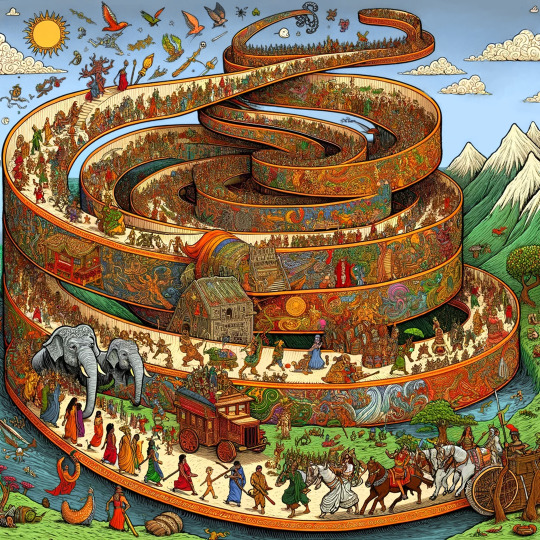
Heard of Mahābhārata? This ancient Indian epic is about ten times the length of Homer's Iliad and Odyssey combined.
Meaning: it never ends.
Its longest version consists of over 100,000 śloka or over 200,000 individual verse lines (each śloka is a couplet), and long prose passages. At about 1.8 million words in total, the Mahābhārata is about four times the length of the Rāmāyaṇa, compiled as oral and written stories between 3rd century BCE and the 4th century CE.
It is an ultra-marathon of moral conundrums, philosophical dilemmas, and the classic tussle between team good and team evil, all rolled into an astonishing narrative feast.
#history art#mahabharata#india#culture#art#history of india#ramayana#odyssey#hindu mythology#ai experiments#illustration#fun facts#history#indian#sanskrit#narrative#storytelling#ancient history#epic#books and reading
14 notes
·
View notes
Text

27 notes
·
View notes
Text
When you read Valmiki Ramayana and see how the processes and preparation for Ram's coronation you can't help but feel terrible for Ram.
People all excited to welcome Ram. He hears some people talking how Ram on ascending the throne would mean peace and prosperity for many years to come. Dignitaries have come from all over the country, like a full public event. Ram looks so regal only to let go all of it in a few moments unaware of his mother Kaikeyi's intentions
And this man I know why our elders would advise us to look upto Ram. This man after getting a terrible blow and getting an exile akin to a death sentence from his mother who loved him dearly and was even so happy with the news of Ram's coronation. He is then asked to leave the palace immediately for 14 years like never once come back for 14 years.
Keeping myself in Ram's position to not come back home once for so many years would kill me. I don't think I would give any thought about promises dharma or karma then when I would be told to go away.
And do you all realize that he was giving up an empire which was rightfully his? To learn from Ram, I think we must learn to keep ourselves in his position and think what our step would be and see the difference between Ram's behaviour and thoughts and us.
It's like you are told that you will have a promotion at work and get a high position. Everything is set. The people, your new cabin, your new post everything and once you come to office to begin your duties you are told that you won't get promotion without stating what you did wrong or where your efforts lacked.
Tell me how would you feel?
This is similar to Ram's case too. For him promotion would mean to be the king and take control of a grand empire. You must see how Valmiki describes Ayodhya. I would love to live there.
And when he is walking back to his own palace (ram and sita lived in a separate palace away from Dasharath's) he doesn't use the parasol and the chariot.
Today every person whom I talk too regarding Ram, I see everyone getting angry and pointing faults at him.
This is epic Kaikeyi behaviour. Kaikeyi after getting her mind poisoned not once does she think of ram and her relationship with him, his qualities, etc. We too do the same thing. All this while I always said Ram shouldn't have done this should not have done that why should Ram be idealized?
Growing up I realise why dada dadis would tell us to be like Ram. You can be steady and calm in good situations how do you keep your self steady and calm when life is being unfair to you? We all slip into sadness, submit to grief and anger and worse into all sorts of terrible addictions to cope with it.
And what did we do to Ram? Forget learning from him, we politicise him. Ram is a tool for vote bank, Jai Shri Ram is a war cry and shit like that.
Kaikeyi was unfair to Ram and so are we. We are no better.
Just like what my elders did, I am going to tell my children and the upcoming generation about Rama and to be like him.
Jai Shri Ram 🙏
#samridhi speaks#ramayana#this post... yesterday I was listening to valmiki ramayan by 21notes on youtube#when this part came up I turned so emotional and had to write this in the. morning#I was in a terrible phase two years back and keep falling back into the same spiral again and again sometimes#Ram is the only one who shall keep me going#this man gave up entire kingdom and riches#I only have a neet exam to pass#but yes today's kids who don't read the epics and think it to be boring you all be missing out so many important lessons#also I am so thankful that my first books given to me to read were panchatantra#ramayana mahabharat and hitopadesha#I read ramayana and mahabharata when I was in nursery and I thank the Gods for it
17 notes
·
View notes
Photo
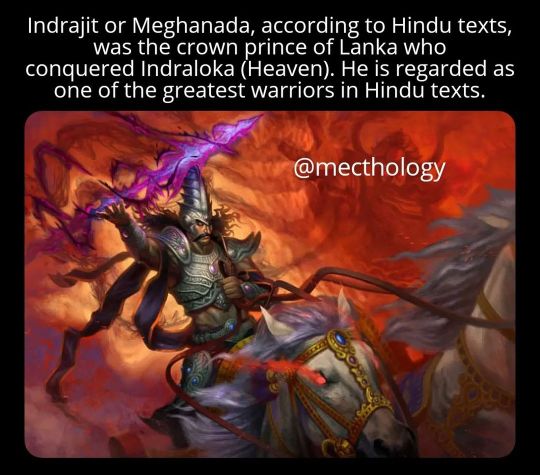
Meghanada from Hindu mythology.
Using Brahmastra, Indrajit killed 670 million Vanaras in a single day; nearly exterminating the entirety of the vanara race. No warrior had ever achieved this statistical feat before in the Ramayana.
Indrajit (conqueror of Indra) was the eldest son of Ravana and Mandodari. He was named Meghanada after his birth because his birth cry sounded like thunder. When Meghanada was going to be born, Ravana wished his son to be supreme so that no one in the world could defeat him. Ravana was a great astrologer. To make his son immortal, he commanded all the planets and constellations in such a position that would allow his son to be born the way he wanted. Because of Ravana's anger and power, all the planets and constellations feared him. All the planets aligned in such a way that they came in the 11th house of Meghanada's horoscope. However, Shani (Saturn) had disobeyed Ravana's orders and had settled in the 12th house of Meghanada's horoscope. Ravana became furious at this and blamed Shani. Due to the state of Shani, Meghanada had to die at the hands of Lakshmana in the war between Lord Rama and Ravana.
During the battle between the Devas and Ravana, Lord Indra, king of heavens accompanied by all other devas captured Ravana. To rescue his father, Meghanada attacked Indra and his elephant Airavata, and defeated all the Devas, even Indra. He tied and mounted Indra onto his celestial chariot and brought him to Ravana in Lanka. Ravana and Meghanada decided to kill Indra. At this juncture, Lord Brahma intervened and asked Meghanada to free Indra. Meghanada obliged and was granted a chance to ask for a boon from Brahma. Meghanada asked for immortality, but Brahma remarked that absolute immortality is against the law of the nature. Instead, he was then granted another boon that after the completion of the fire-worship of his native goddess would be completed, he will get a celestial chariot, mounting on which, any enemy can't kill him in a war and become invulnerable. But Brahma also cautioned him that whosoever would destroy this yagna, would also kill him.
Follow @mecthology for more mythology and lore. DM for pic credit or removal. https://www.instagram.com/p/CeRMqGbJna_/?igshid=NGJjMDIxMWI=
#Indian mythology#mythology#mecthology#mitologia#god#demon#powerful#ramayana#ravan#indra#hinduism#mitoloji#myth#divine#ancient#epic
6 notes
·
View notes
Text

#Ram Dhanush#Hindu Mythology#Ramayana#Lord Rama#Divinity#Sacred Bow#Mythological Artifact#Epic Tale#Symbolism
0 notes
Video
youtube
Angry Lord Rama | భూమండలాన్ని గడగడలాడించిన రాముడి ఆగ్రహం! | MPlanetLeaf
#youtube#Angry Lord Rama#Angry Lord Ram#angry rama#angry ram#రాముడి ఆగ్రహం#భూమండలాన్ని గడగడలాడించిన రాముడి ఆగ్రహం#mplanetleaf#voice of maheedhar#hindu epic#ramayana#hanuman#ayodhya#ayodhya ram#ram setu#lord ram#lord rama
0 notes
Text
Dussehra or Vijayadashami: A Festival of Good over Evil
Dussehra, otherwise called Vijayadashami, is a significant Hindu festival commended consistently toward the finish of Navaratri. It denotes the victory of good over evil and is seen in various structures of the nation.
The festival is commended on the 10th day of the long stretch of Ashvin in the Hindu schedule, which ordinarily falls in the Gregorian long stretches of September and October.…
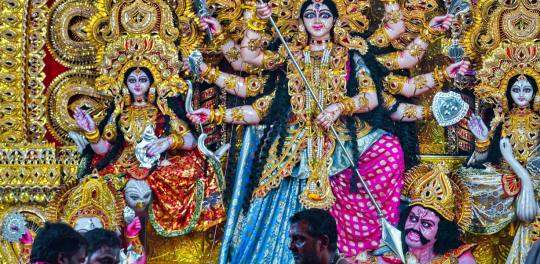
View On WordPress
#Celebrations#Cultural heritage#Cultural significance#Divine blessings#Dussehra#Effigy burning#Epic battle#Festive processions#Festive traditions#Folk dances#Goddess Durga#Good over evil#Hindu festival#Lord Rama#Mythology#Ramayana#Ravana#Religious observance#Religious rituals#Victory of light#Victory of righteousness#Victory of truth#Vijayadashami#Worship
1 note
·
View note
Text
0 notes
Text

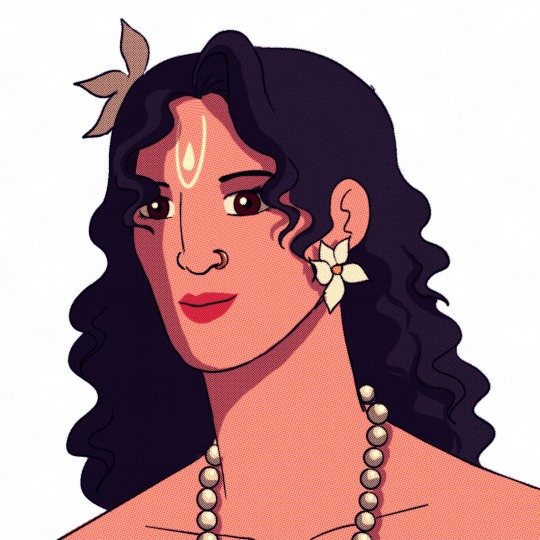
@questionableresponses I tried :')
#vasant#vasanta#vasantblr#hindu mythology#hindu gods#hinduism#legend of prince ram#ramayana#ramayan#valmiki ramayan#ram#hindu myths#epics#hindu epics#hindu#hindublr#desiblr#desi tumblr#desi tag#desiposting#desi side of tumblr#desi
26 notes
·
View notes